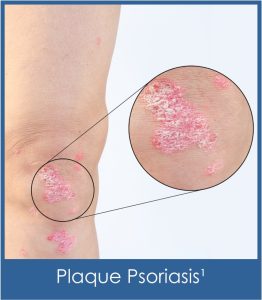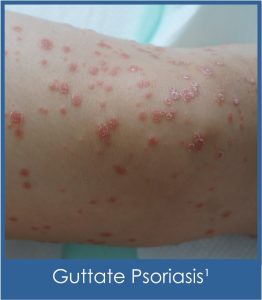Psoriasis is a condition that causes skin cells to build up and eventually leads to thick and scaly dry patches. Psoriasis has both genetic and environmental risk factors and is caused by issues in the immune system. It can be triggered for a number of reasons, such as stress or infections, depending on the patient.
At Houston Dermatology Specialists in Cypress, TX, Dr. Downing provides treatment for psoriasis for men and women of all ages throughout the greater Houston area.
If you or a loved one suffer from psoriasis, treatment is available. Please call (713) 487-8233 or request a consultation online to schedule a consultation with Dr. Downing.
Categories of Psoriasis
There are different categories when classifying psoriasis, each type varying in appearance and location on the body. Dr. Downing has conducted over 20 clinical studies regarding psoriasis and, therefore, is very familiar and knowledgeable with each class of this condition.
Common types of psoriasis include:
- Chronic plaque psoriasis
- Guttate psoriasis
- Inverse psoriasis
- Erythrodermic psoriasis
- Pustular psoriasis
Plaque Psoriasis
One of the most common types of psoriasis Dr. Downing sees in his Houston dermatology office is plaque psoriasis. Approximately 90% of individuals who have psoriasis have developed this type.1
Plaque psoriasis includes the appearance of thick and raised skin, dry scales with a silver-like coating, and various plaque sizes combining together to form larger plaques.

Guttate Psoriasis
Guttate psoriasis is often seen in children and young adults. It can be temporary and clear within a few weeks or months without treatment, but this, of course, varies for each patient.1 It is also possible that someone with guttate psoriasis will develop plaque psoriasis later on in life or in conjunction with guttate psoriasis.
Guttate psoriasis has the appearance of tiny bumps scattered around, almost like rain drops, with a salmon/pink color.

Inverse Psoriasis
Inverse psoriasis typically develops in skin folds such as the armpits and crease of the buttocks and also in the genitals.
Inverse psoriasis has the appearance of smooth, red patches which makes the skin look raw. It has little to no silver-white coating and can also be sore to touch given the severity.
Erythrodermic Psoriasis
Erythrodermic psoriasis is a rare form of psoriasis. It involves symptoms such as chills, fever, muscle weakness, severe itch, and rapid pulse.1 An individual with erythrodermic psoriasis has skin patches that appear to look burned.
Pustular Psoriasis
Pustular psoriasis is another rare form of psoriasis. This involves pus-filled lesions that appear more commonly on the feet and hands. The skin is extremely sore and painful which can make activities such as typing or walking unbearably painful.1
Pustular psoriasis maintains the appearance of red and swollen skin that has scattered pus-filled bumps.
Treatment for Psoriasis
Psoriasis can be controlled, given proper treatment. If you are an individual that has been diagnosed with psoriasis or has a family history of psoriasis, visit Dr. Downing, a board-certified dermatologist in Houston, where you can learn about this condition and what can trigger it and also receive the proper medication that will work best for you.
Risks of Psoriasis
Having psoriasis can increase the risk of developing other diseases such as psoriatic arthritis and diabetes.2
Dr. Downing always makes sure to be on the lookout when examining his patients for early signs of psoriasis because early detection helps prevent the disease from worsening.
Schedule Your Psoriasis Treatment Consultation Today
If you have any questions regarding psoriasis or any concerns about your skin, please contact our practice at (713) 487-8233 or request a consultation online to schedule your appointment!
References
- Psoriasis: Signs and Symptoms. (2023, May 9). American Academy of Dermatology. https://www.aad.org/public/diseases/psoriasis/what/symptoms
- Psoriasis: Overview. (2023, May 9). American Academy of Dermatology. https://www.aad.org/public/diseases/psoriasis/what/overview


Leave a Reply